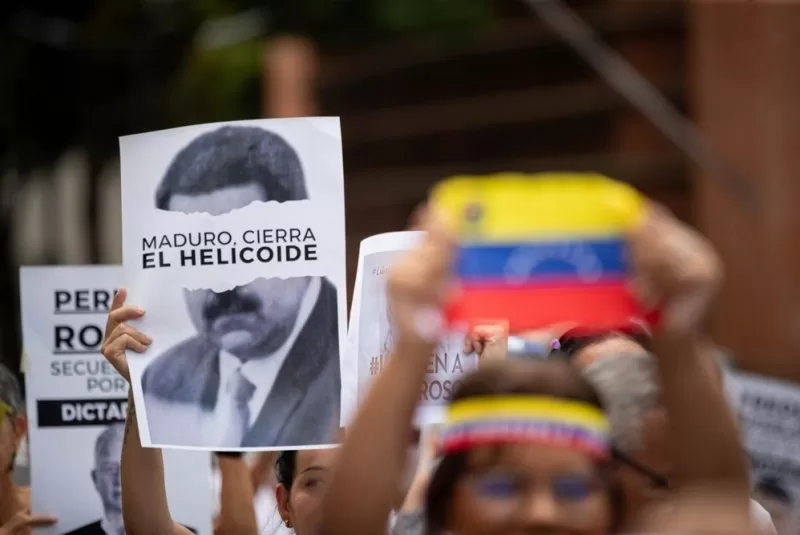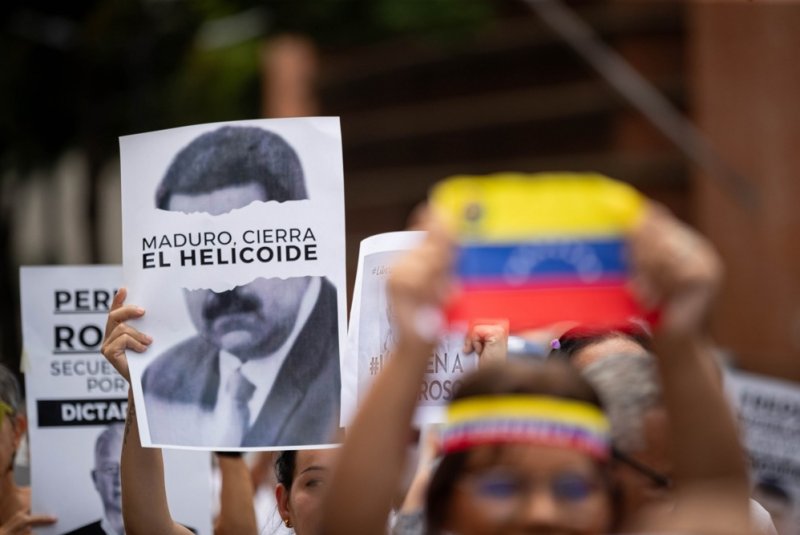A man holds a sign with the image of Venezuelan President Nicolás Maduro and text that reads: “Maduro, close the (Centro Penitenciario El Helicoide)” during a protest by the families of political prisoners demanding their release in Caracas, Venezuela, on September 11. Photo by Ronald Pena Jr./EPA-EFE
Sept. 20 (UPI) — A pair of prominent Senate Democrats said Friday they plan to introduce legislation targeting the “oppressive regime” of Venezuelan strongman Nicolás Maduro and his efforts to “steal” the July 28 presidential election.
The Support the Venezuelan Electorate’s Rejection of Dictatorship and Aspiration for Democracy (VERDAD) Act of 2024 will be introduced by Sens. Ben Cardin, D-Md., chairman of the Senate Foreign Relations Committee, and Tim Kaine, D-Va., leader of the panel’s Subcommittee on the Western Hemisphere, the pair announced.
Under the measure, Maduro’s now-exiled opponent, Edmundo González Urrutia, is recognized as the rightful winner of the election and makes it U.S. policy to support a peaceful transition of power to he and opposition leader Maria Corina Machado.
It also provides for targeted sanction provisions on Maduro regime officials who are “engaged in repression and the undermining of democratic governance” and expands existing sanctions on Russian, Chinese, Iranian, and Cuban entities providing security support to the Venezuelan leader.
“As I told Maria Corina Machado during our recent phone call, my support — and that of my colleagues in the U.S. Congress — for the Venezuelan people is unwavering,” Cardin said. “The United States must now lead by imposing clear consequences on Maduro for his fraudulent actions and arbitrary detentions, and work together towards a prosperous post-Maduro Venezuela.”
The Biden administration and most of the international community contend González Urrutia handily won the most votes in the presidential election and blame the Maduro-controlled National Electoral Council for failing to substantiate its claims that the strongman actually won. The council has “refused to uphold international and Venezuelan standards of transparency or to respect the will of the Venezuelan people as expressed at the polls,” the U.S. State Department says.
Maduro’s refusal to hand over power led to a massive wave of largely peaceful protests across the country in late July and August which were met with a brutal military crackdown in which at least 24 people were killed, according to Human Rights Watch.
“The Maduro regime’s brazen disregard for democratic institutions, rule of law, and human rights has created the largest displacement crisis in Latin America, exacerbating migration in our hemisphere,” Kaine said. “We cannot stand by as Maduro continues to defy the will of the Venezuelan people, and as Venezuelans suffer from rampant violence and shortages of basic goods like food and medicine.”
Earlier this month a U.N. Independent International Fact-Finding Mission reported that Maduro is again ramping up efforts to repress peaceful protests in Venezuela.
“We are witnessing an intensification of the state’s repressive machinery in response to what it perceives as critical views, opposition or dissent,” said Marta Valiñas, leader of the fact-finding mission.
The Treasury Department has already imposed sanctions on 16 Maduro-affiliated individuals, including leaders of the National Electoral Council, the Supreme Tribunal of Justice, and the Maduro-affiliated national assembly.
And on Thursday, the European Parliament approved a resolution similarly recognizing Gonzalez Urrutia as the legitimate winner of Venezuela’s presidential elections.

